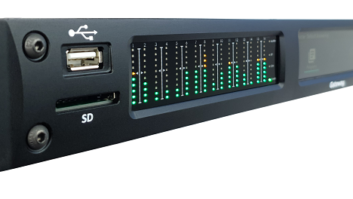Budgeting; doing more with less; saving money.
These are the “new” rules of radio engineering, and they require a fresh mindset. I’ve spoken to a number of engineers who are thinking out the box when it comes to their 2003 budget. If you’ve worn your eraser to a nub, figuring and re-figuring your technical budget, here are some suggestions that will make you look great.
(click thumbnail)Fig. 1 shows a “kilowatt-hour meter” that you can purchase from any electric supply.

. . .
Do you have tenants renting space on your tower? Depending on the number of tenants and their power usage, you might consider splitting their AC feed from yours.
Even if you don’t have tower tenants, this kind of meter can save you money. In this station’s case, the meter monitors the tower light power usage. The station is the only tenant at the site, but they don’t own the tower, and the tower owner is responsible for keeping the tower lit.
. . .
Consider a phone audit. Especially in the case of consolidated stations, you may have no idea what the phone company is charging your stations each month.
In my own case, when I was a chief, we had lines and loops that were supposed to have been disconnected 10 years earlier but had not been. We pressed the phone company, and got a check for $10,000 for the over-charges.
My only mistake was being stupid enough to think I’d get some kind of bonus for my efforts.
Don’t make my mistake; before you even approach the research, talk with your general manager. Explain that you’d like a bonus of 10 percent for the savings you find. Get it in writing, and summarize it in a brief memo to him, outlining the terms. If he balks, point out that he, the program director and the sales manager get bonuses for hitting goals. If you can provide the station with some savings, why shouldn’t you share too?
If he still doesn’t get it, maybe you ought to look around for another gig. Plenty of GMs do get it, and are realizing that their engineers are a precious commodity.
You can also point out that there are companies that perform this service for 15 to 20 percent of the savings, so he’s getting a break if you do the work for only 10 percent. It’s time you put some money in your pocket for all the extra things you do for the station.
Remember my plight. I didn’t ask for it, so I didn’t get it. Ten grand in the 1980s was a lot of money; it still is. Consider it mining for gold.
Once you get the ground rules established, it’s time to tackle the phone company.
Usually grudgingly, they will do a complete billing audit, showing every line, circuit and loop that makes up your monthly bill. Remember, sometimes there are several telephone bills: one for the studios, another for the transmitter sites, maybe even permanent remote loops.
Buy the phone company person lunch to review what they found. This is an important step. These audits use a lot of telco lingo that you’ll never figure out on your own. Having the telco person go over the bill with you will save you time.
If you find circuits that are no longer in use, keep quiet, just review the entire bill(s), jotting down any pertinent notes. When you get back to the station, the fun begins. In the case of POTS circuits (Plain Old Telephone Service), start dialing unfamiliar numbers.
One engineer called this the “dialing for dollars” phase. As he dialed, he found a number for a Chinese restaurant. Yes, the radio station was paying for the phone at this Chinese restaurant. I can hear the owner now: “Ain’t America great? I got a phone, someone else gets the bill!”
In the case of consolidations, you’ll be amazed at what you find. Don’t get over-zealous, though. One engineer confided that he mistakenly took down the entire key service at a remote location, thinking the lines were no longer used. The lines were used for a weekend call-in show. The phones were unplugged during the week, hence no answer when he called.
Tabulate your findings. Does the newsroom really need three fax lines? Ditto for sales. The audit also should show you the cost of “private” lines. It’s amazing how the GM will make these go away when he sees the real cost and what it’s doing to his bottom line.
You’ll find this adventure will really bond you to the GM and business manager. You are seen as saving money, instead of spending it all the tiem.
After you refine your list, it’s time to meet with the phone company. Be advised, they’ll try to get you to take the over-payment in the form of “bill credit.” Press for a check. Get your telco analyst or local supervisor to deliver the check to the station, again, plan a lunch with the GM and perhaps the business manager.
Your last step is to guard against “amnesia.” Make a copy of the check, attach the copy to your original memo to the GM, outlining your “bonus.” Also include a calculation sheet, showing what the total of your bonus check should be. This ensures there will be no mistakes, no “amnesia.”
. . .
Just in case you think I’m going a little overboard on all this documentation stuff, here’s an example of why you have to watch out for yourself.
One engineer recently submitted an idea to Workbench. Radio World pays a modest honorarium for published submissions. I used his topic in a column, so Radio World’s home office mailed off the check.
The check arrived, and the station cashed it. They wouldn’t give it to the engineer. We’re talking about 25 bucks, folks!
One of the things that makes this column so valuable are the contributions by individual engineers. The submissions are not part of anyone’s job; they are done on an engineer’s own time, to help his peers.
Except for pictures of towers about to fall, the submissions reflect positively on the station and the engineer. It’s my intention, and Radio World’s, that this honorarium be a small token of appreciation to someone who desires to help others. It’s certainly not intended as “income” to a radio station.
(click thumbnail)Fig. 2 Looks like a case for ‘Radio Miss Utility.’

. . .
They’re running a lot of “Miss Utility” spots on the stations here in the Washington area. We’ll wrap up with another reason why you want to supervise any work done at the transmitter site.
Buried in the rubble of Fig. 2 is a radial, a piece of coax and even part of a “caution” ribbon that was buried right above the cables.
If you’re laying new line, consider the few dollars’ investment in covering the line with about 6 inches of dirt, then laying the “caution” ribbon and filling in the rest of the trench.
One engineer posted a “no digging” sign at the entrance to his property, adding the station number for any inquiries.








